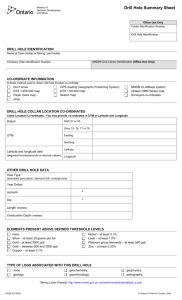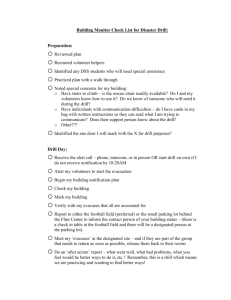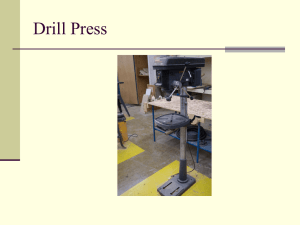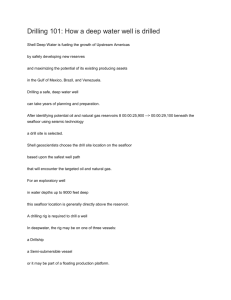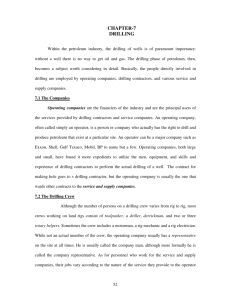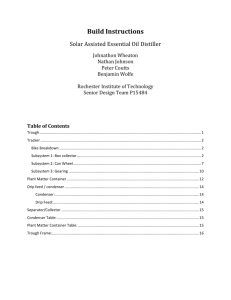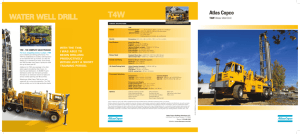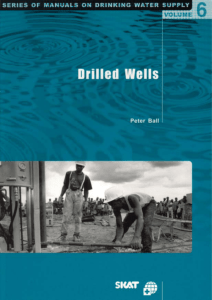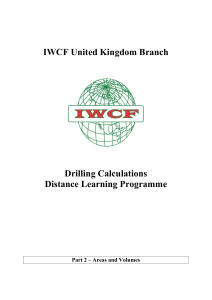Overall Drilling Rig Diagram
advertisement
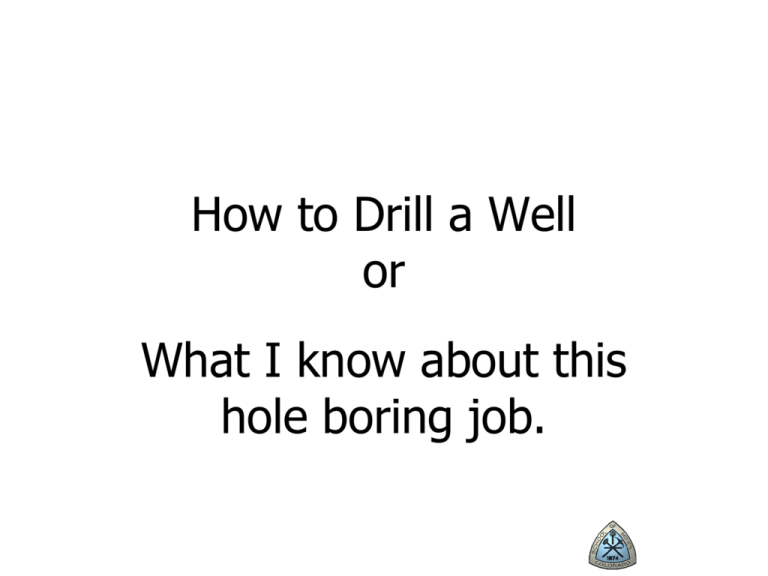
How to Drill a Well or What I know about this hole boring job. Wellbore Construction • How deep? • Where is it? • What do you want to do with it? © 2010 Eustes, Bourgoyne, Fleckenstein, and Pearson 2 Typical Casing Strings © 2011 Eustes 3 How to Drill a Well - Part 1 • Determine location – Geology – Legal – Economic • Prepare site – – – – – – – – – – Survey Clear Level Water source Reserve pit Roads Reclamation Dig cellar Dig rat hole and mouse hole Set conductor pipe © 2011 Eustes 4 How to Drill a Well - Part 2 • Move in rig up (MIRU) drilling rig – Rigs are portable – Assembly • Drilling – – – – – Spud Keep a sharp bit on bottom Add joints every 30 feet Tripping Use mud • Liquid – Oil – Water • Pneumatic – Air – Natural gas – Nitrogen • Drill surface hole © 2011 Eustes 5 How to Drill a Well - Part 3 • Run surface pipe – Protect fresh water – Anchor BOPE • Cement surface pipe – WOC – Nipple up BOPE • Drill out of surface pipe – Leak off test • Drill ahead (turn to the right) • Evaluation while drilling – – – – Mud logging Coring MWD Drill stem tests (DST) © 2011 Eustes 6 How to Drill a Well - Part 4 • Trouble – – – – – – Kicks and blow-outs Lost circulation Stuck pipe Fishing Mechanical breakdown Lost hole • Run intermediate casing – Protects hole • • • • Sloughing High pressure Low pressure Salt – A liner is casing that doesn’t reach the surface • Cement intermediate casing • Drill out of intermediate casing © 2011 Eustes 7 How to Drill a Well - Part 5 • Drill ahead • Reach total depth (TD) • Evaluate – Logging • Electrical • Acoustical • Radioactive – DST • Three things can happen – Production is found – Dry hole – Learned science © 2011 Eustes 8 How to Drill a Well - Part 6 • Lay down drill pipe and BHA • If a keeper – Run production casing – Cement • If a dry hole – Plug and abandon (P&A) as per regulatory requirement and prudent operators procedures • Rig down move out (RDMO) drilling rig • If a keeper – – – – MIRU Completion Unit Complete well Stimulate Run completion equipment • If a dry hole - Oh well. © 2011 Eustes 9 Directional Possibilities S-Shaped Well Slant Well Re-entry Production Zone Horizontal Well Short Radius Courtesy of Baker Hughes Inteq © Eustes 2011 10 Side Force and Tilt Angle Hole Gauge Side Force at Bit Side Force at Stabilizer Resultant Force at Bit Hole Axis Formation Anisotropy Bit Tilt Angle Courtesy of Baker Hughes Inteq © Eustes 2011 11 Formation Navigation Resistivity Neutron Gamma Ray Density • • • • • Inclination Measurement Multiple depths of investigation for quantitative determination of formation resistivity (Rt) Early bed boundary detection A near bit inclinometer, enabling quick response to inclination changes A steerable motor system, permitting variable build rates for up to 15°/100ft Dual azimuthal gamma ray sensors 180° apart, providing high and low side measurements Courtesy of Schlumberger © Eustes 2011 12 Slide and Rotary Modes • Slide Mode • Rotary Mode – Used for “deviating” – Used for “going straight” • Wellbore Trajectory • Wellpath – Controlled curvature – Controlled direction – No drill string rotation – Behavior same as a rotary drilling assembly – Hole slightly over size Courtesy of Baker Hughes Inteq © Eustes 2011 13 Overall Drilling Rig Diagram © Eustes/Bourgoyne 2010 14 Rig Equipment • Power • Drill String – Motors – Compound – – – – • Hoisting – – – – Drawworks Blocks and Tackle Mast Substructure • Well Control – Blow-out Prevention Equipment • Ancillary • Circulation System – Instruments and Doghouse – Mud Pumps – Capacity – Solids Control System • Rotary Table © Eustes/Bourgoyne 2010 Swivel and Kelly Drill Pipe Bottom Hole Assembly Bit 15 Colorado School of Mines • Established in 1874 in Golden, CO as a public institution of higher education • CSM is devoted to Earth, Energy, and the Environment • 4,500 students – 3,300 undergradautes – 1,200 graduates • Thirteen degree granting departments or divisions • SuperSchool offered July 1129, 2011 on the Mines Campus http://csmspace.com/events/superschool/ © Eustes 2011 16
